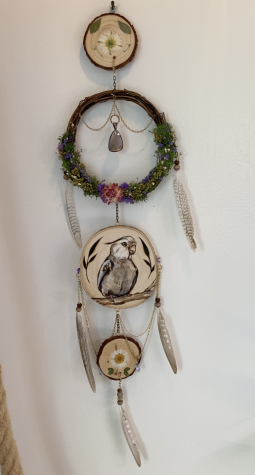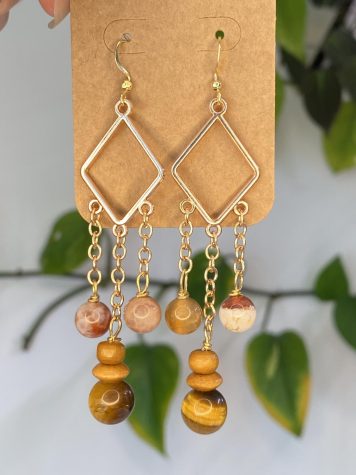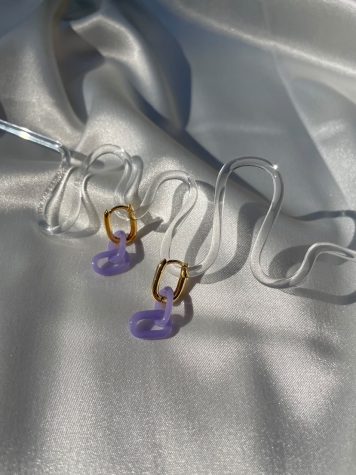Between attending classes and working jobs to support their businesses, student entrepreneurs face a multitude of challenges.
Jacob Warman’s passion for drawing began when he was young. He grew up visiting his mother once a week at a Barnes and Noble, where he would spend hours drawing pictures based on anatomy books. He found himself in awe of skater designs and Japanese tattoo art as he grew up, eventually launching his sustainable clothing business, KNUCKLEHEAD, in August of 2021. He takes inspiration for KNUCKLEHEAD from brands like Supreme and Sketchy Tank, both brands that cater specifically to the skater lifestyle.
“Supreme blew up because it captivated the skater niche before it was mainstream,” the junior visual media arts major said. “That’s my goal—to captivate that niche.”
Each design was created by Warman five years ago and though he has revised them, the skeletons of the drawings remain the same. Eventually he wants to start releasing short animations for each design—a task he hopes his 2D art class will help with.
His goal was to make “your favorite t-shirt”—best quality, custom neckline, sustainable material. Refusing to sacrifice quality, Warman stalled launching his brand, working three internships at once to save enough money to purchase his inventory. KNUCKLEHEAD launched on Aug. 3, 2021.
Last summer Warman lived in Los Angeles, where he spent his time interning and attending pop-up shops to get his brand out.
“I would do a pop-up Saturday, Sunday—nine-hour days—and bring all the equipment myself,” he said. “What I really want to start doing is find passionate people in fields that I may lack and start to build a team.”
Warman ran into issues with high shipping costs when he moved back to Boston for the Fall 2022 semester. With manufacturers in LA and Brooklyn, New York, he had to decide if switching to a Boston-based manufacturer would be more feasible. Ultimately, Warman said he “bites the bullet.”
“Because [Boston] is a smaller city, there’s less competition, so screen printers and embroiderers double the cost just because they can,” he said. “In LA, it’s so saturated that the costs are very competitive. That’s been a real problem.”
International conflicts and the pandemic have slowed the supply chain by limiting freight and overseas shipments. Labor shortages across the world have also added to this ongoing issue with more than 47 million workers quitting their jobs in 2021.
“When you tell [consumers] the price, it usually doesn’t go how you think it would,” Warman said. “It’s very difficult trying to juggle being a very conscious, sustainable brand, while also thinking about how much others are willing to pay for the art.”
There were many times Warman was tempted to give up—days when he lost money at the pop-ups or had too many tasks to juggle. His turning point came this past summer, when he started thinking about KNUCKLEHEAD as an extension of himself, rather than just a business.
“That mental shift really helped me because these things aren’t obstacles anymore,” Warman said. “It’s just the next step.”
Alex Lang, sophomore political communications major, started their business, A Feather From Sunshine, last year. They sell their goods on Etsy and at markets during the summer.
Their work focuses on sustainable and ethically sourced wall-hanging pieces made from feathers from their three rescue parrots. They also create custom pieces with feathers from customers’ birds and sell wall-hanging pieces and wood burnings made from washed up driftwood from the ocean shoreline.

Bird feather wall hangings by Alex Lang.
“When I transitioned into college, I really wanted to start my own business, specifically after I saw the emergence of people growing their small business on social media,” Lang said. A lot of the orders they get are from their exposure on social media.
Since starting their business, Lang found themselves doing more custom pieces while at school—a luxury allowing them to dedicate hours to one piece and sell it for a few hundred dollars. When vending, preparation begins two-to-three weeks in advance—an essential given their full-time student status.
“I do a lot of burning, I do a lot of fusing things that I can’t bring to the dorm,” they said. “I have a whole studio at home, so not having my studio is really hard.”
Unlike Warman, who works alone, Lang sells their goods with their partner, but is looking to expand their team once they have enough money to pay their employees well.

Jewelry made by Alex Lang.
At times, Lang found themselves spending hours on pieces and selling them for very little, which made it difficult to stay motivated.
“Finding the audience that will actually value your work is harder than you would expect, but they are out there,” they said.
In November, Lang will be consigning out of Plant Markets at the Armory in Somerville, Massachusetts.
Ellye Rose Studios began while sophomore interdisciplinary major Ellye Sevier was bored in quarantine. Having worked with glass since she was 12, Sevier worked to create jewelry pieces in a color scheme that spoke to her as an artist. Like Warman and Lang, Sevier vends whenever she can, selling her jewelry in addition to glass strawberries and botanical items.
“I’m really focused right now on making glass chain—that’s one of my favorite things to do,” she said. “I’ve been incorporating that design into some earrings and making glass chain necklaces and chokers and things like that.”

Glass chain jewelry from Ellye Rose Studios.
Like Lang, Sevier also sold on Etsy but has since moved her business to her own Wix site to create a sense of brand identity.
“On Etsy…every listing is separate,” she said. “You’ll have your page, but most of the time when people view your items, it’s a wide search on a bunch of other items.”
Since moving to college, Sevier mostly engages with her online audience over her various social media platforms. Any order she gets is sent to her mother in Tacoma, WA to package and ship the order.
“My mom is a huge support at home,” Sevier said. “She handles shipping and packaging and stuff like that.”

Glass jewelry from Ellye Rose Studios.
Students who are looking into entrepreneurship can enroll into Emerson’s entrepreneurship minor, the E3 program, run by Senior Executive-in-Residence Lu Ann Reeb. E3 is a yearlong experience that provides students a space to learn about entrepreneurship and pursue their passion alongside others. Reeb, who has started three businesses of her own, considers this sense of community to be one of the most important aspects of E3.
“What E3 does is combat that loneliness,” she said. “Each student isn’t isolated in her or his own mind to try to figure out the idea.”
In E3, students learn about target markets, design thinking, evaluations, and finance to learn how to start and maintain a successful business. The program culminates in the E3 Expo where students compete by making five-minute pitches for a chance to win up to $5,000 towards their businesses.
In 2022, Pranit Chand, a senior data science and economics major with an entrepreneurship minor, was the first runner-up of the E3 Expo scholarship, and plans to invest the money into his business. Chand is working to develop a platform where people can invest in content creators—“The New York Stock Exchange or NASDAQ, but for content creators,” as he calls it. He hopes that in time, his platform will help creators develop and find success in their careers quickly.
“One day I was working, and my friend called me and said, ‘I have an idea,’ and it was the marketplace idea,” Chand said. “I [thought] this could really be the breakthrough that I was thinking about in terms of how you can solve a starving artist phenomenon.”
One of the biggest obstacles for Chand in developing his business is managing his time, something Emerson’s E3 program has helped him with. In the past, Chand adopted an idealistic perspective, but through his education in the E3 program, he readjusted his goals.
“It’s not really about changing the world or anything, it’s about solving a problem,” he said. “At the end of the day, if you have a problem and you’re willing to solve it—and have someone pay you for it—that’s basically it.”
Reeb also said time and money are the two biggest hurdles for student entrepreneurs.
“[Students] are really busy,” she said. “They really focus on the ideation part of [the business]—figuring out how to monetize it and figuring out how to market it and figuring out how to prototype something.”
Many students both in and out of the E3 program don’t just want to start a business after college, but are working to build it while still in school. According to Reeb, in recent years, more students are working on these businesses. She attributed the influx to the pandemic that led to opportunities for “alternative work arrangements.” She believes that, despite the struggles entrepreneurs face, it can be a very rewarding experience, as long as you truly love what you’re doing.
“I don’t like to use the word passionate anymore,” she said. “I think it’s overused. If you don’t feel good about what you’re doing, you’re going to be miserable. I would tell entrepreneurs, you absolutely have to really, really love what you’re about to undertake.”